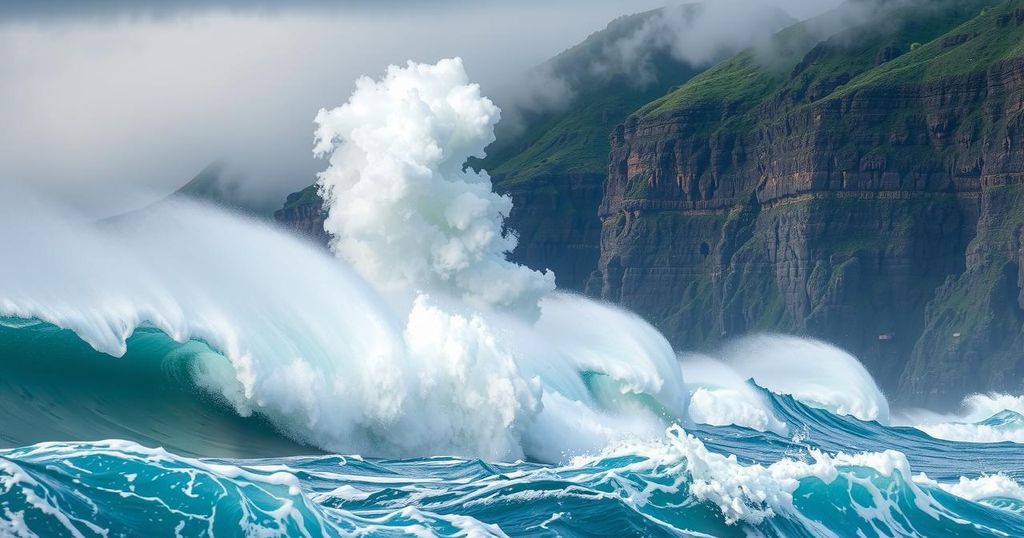Powerful waves reaching heights of 4 meters have hit the coasts of Ecuador and Peru, leading to two fatalities. The Peruvian government has closed 91 ports while assessing ongoing risks. Local fishermen face significant challenges with damage to their boats and livelihoods, prompting calls for assistance. The phenomenon, linked to climate change, began on Christmas Day and is expected to last until January 1.
In recent days, the coastal regions of Ecuador and Peru have experienced devastating conditions due to powerful waves reaching heights of up to four meters. This weather phenomenon has resulted in the tragic loss of two lives in Ecuador’s Manta area, as confirmed by Jorge Carillo, Ecuador’s secretary for risk management, who referred to the situation as an “extreme event.”
In response to the continuing threat, Peru’s authorities have closed nearly all ports, totaling 91 closures, to ensure public safety amid the relentless onslaught of waves. Reports from the Peruvian Navy indicate that these hazardous conditions, which began on Christmas Day, are expected to persist until January 1, although there may be a moderation in intensity afterwards.
The source of these anomalous waves has been attributed to climate change, as stated by Larry Linch, head of the Civil Defense unit in Callao, Peru. Images from local media showcase severe flooding in public spaces across several districts, forcing residents to evacuate to higher ground.
Local fishermen have voiced their concerns, highlighting the extensive economic impact on their livelihoods. Affected communities report damage to an estimated 100 fishing boats, with many fishermen unable to return to their docks due to the perilous conditions. One fisherman, aged 70, noted, “I have never seen such unusual and strong waves,” emphasizing the unprecedented nature of this weather event.
Efforts are being made to assist those stranded at sea, with the navy rescuing 31 fishermen while approximately 180 remain unaccounted for. Additionally, the mayor of Canoas de Punta Sal estimates that over 2,000 fishermen are trapped in the area. Similar conditions have been reported along the central coast of Chile, where authorities have issued warnings.
As the situation unfolds, local leaders are assessing the damage and urging for assistance, particularly for the fisherman who have been disproportionately affected. Amid these alarming events, it is critical for communities to come together to address the ongoing challenges posed by such extreme weather phenomena, which are increasingly linked to broader climate change concerns.
The severe waves impacting Ecuador and Peru are part of a larger trend of anomalous weather patterns associated with climate change. Coastal regions are particularly vulnerable to shifts in oceanic and atmospheric conditions. The situation underscores the need for robust emergency preparedness as communities face increasingly extreme weather events, which not only threaten lives but also jeopardize local economies reliant on marine resources. The current crisis highlights the critical importance of ensuring the safety and resilience of port operations and maintaining maritime safety protocols during extreme conditions. Moreover, the plight of fishermen affected by the disruption of their livelihood emphasizes the need for timely governmental support and mitigation strategies in response to climate-induced events.
In conclusion, the extreme weather conditions brought on by towering waves along the coasts of Ecuador and Peru have resulted in tragic fatalities and significant economic disruption for local fishermen. The closure of numerous ports has been necessitated by safety concerns, while authorities continue to monitor the situation as they prepare for the aftermath of these severe waves. As climate change contributes to the frequency and intensity of such anomalous weather patterns, it remains imperative for governments and communities to develop resilient infrastructures and response strategies to safeguard lives and livelihoods in vulnerable coastal regions.
Original Source: www.abc.net.au






